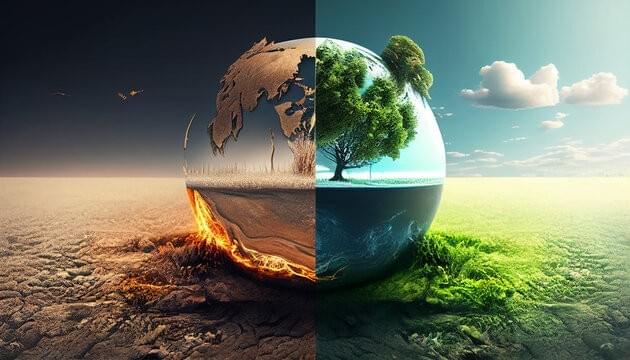
Over the past few years, I’ve found myself increasingly drawn to the topic of climate change—not just as a distant, abstract issue, but as a tangible crisis affecting our lives in profound and interconnected ways. Climate change is not just about melting glaciers and rising sea levels; it is an all-encompassing challenge that ties deeply to issues like gender-based violence, poverty, and healthcare. Its impact is undeniable, and it’s time we start looking at it as the crisis it truly is.
This past week, I’ve been following some alarming weather events. Heavy rains and thunderstorms are predicted in various parts of the world, and the sheer unpredictability of these patterns is unsettling. On top of that, Ethiopia was recently struck by a 5.5 magnitude earthquake. Here in South Africa, the Northern Cape experienced an earthquake so severe that I felt its tremors all the way in Cape Town. These events aren’t isolated incidents—they’re part of a larger pattern that demands our attention.
But the story doesn’t end with earthquakes and rainstorms. Droughts have become a pressing concern for me. Growing up in the village of Ndofela, I remember a time when rivers and wells were full, brimming with life. Today, the reality is starkly different. We can literally count the water left in our natural sources. This isn’t just a problem for rural areas; it’s a national crisis that has ripple effects on agriculture, food security, and livelihoods.
Climate change is not an equal-opportunity crisis. Its effects disproportionately affect women and marginalized communities, deepening existing inequalities. For example, in rural areas, where access to resources is already limited, women often bear the brunt of climate-related hardships. They walk longer distances to fetch water, struggle to grow crops in parched soils, and face increased risks of gender-based violence when forced to navigate unsafe spaces for survival. These challenges aren’t hypothetical—they are the lived realities of countless women and girls.
Moreover, the intersection of climate change and healthcare cannot be ignored. Extreme weather events lead to the spread of diseases, overburdening fragile healthcare systems. People in poverty-stricken communities, who already have limited access to healthcare, are often left to fend for themselves. The link between climate change and poor health outcomes is glaring, and yet it remains under-addressed.
The time to act is now. We need to tackle climate change head-on, not just as an environmental issue but as a multifaceted crisis that touches every aspect of human life. From my perspective, this fight must include:
Education and Awareness: We need to educate communities about the impact of climate change and equip them with the tools to adapt. Knowledge is power, and empowering people with information can drive meaningful action.
Community-Based Solutions: In places like Ndofela, local knowledge and community-driven approaches are key. Solutions must be tailored to the unique needs of each community, ensuring that no one is left behind.
Policy and Advocacy: Governments must prioritize climate action, implementing policies that address the root causes of climate change and support vulnerable populations. Advocacy efforts should amplify the voices of those most affected, ensuring they have a seat at the table.
Gender-Inclusive Strategies: Addressing climate change requires a gender lens. Women and girls must be part of the solution, not just as victims but as leaders and innovators driving change.
Climate change is not a distant threat—it is here, and it is now. From the dwindling water sources in Ndofela to the tremors felt in Cape Town, its impact is undeniable. But amidst the challenges lies an opportunity to act, to innovate, and to create a more equitable and sustainable future.
We owe it to ourselves, to our communities, and to the generations that will inherit this planet to take this crisis seriously. Together, we can make a difference.

